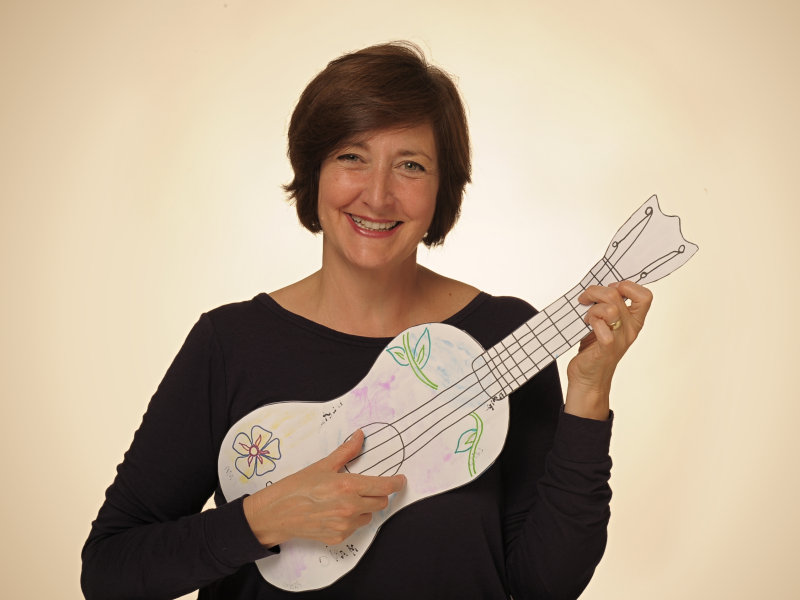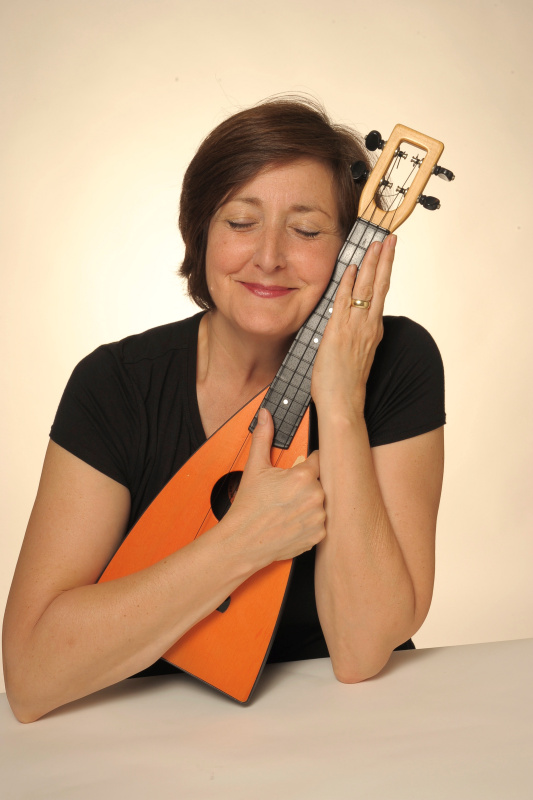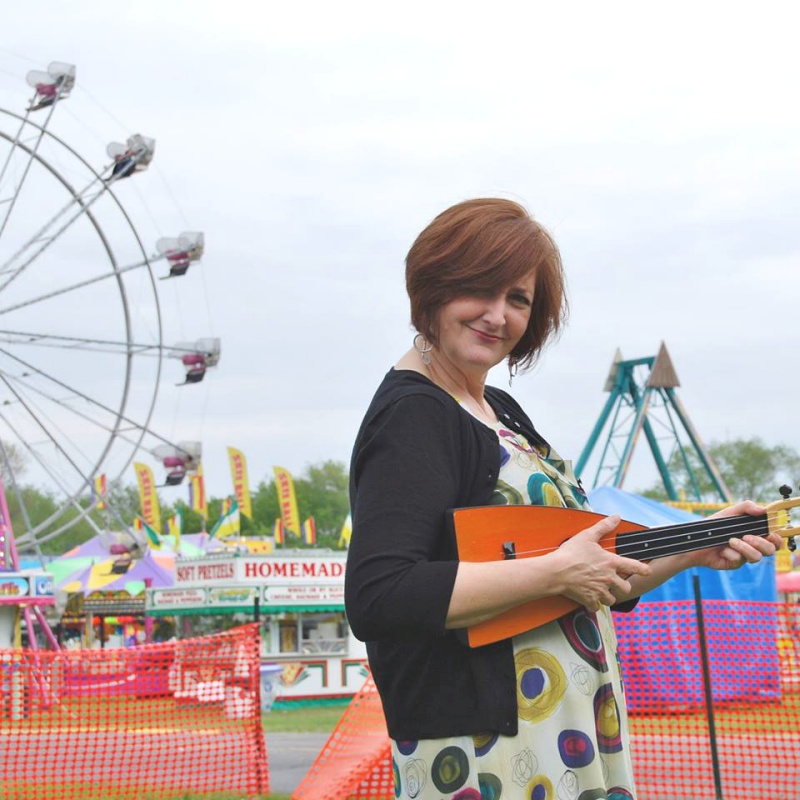
I Love My Fluke
by Susan Salidor
Anyone who knows me knows I love my Fluke. I’ve been playing my Fluke for over fifteen years and it is the only ukulele I recommend.
What is a Fluke? It is a redesigned ukulele made in the United States by the Magic Fluke Company, designed by Dale and Phyllis Webb. Phyllis happens to be the sister of Jim Beloff, a world-renowned ukulele player and enthusiast. Some of you might own one of his fabulous songbooks for ukuleles, including The Daily Ukulele.
Here’s how I fell in love with my Fluke.
When I turned forty, two of my friends/bandmates gave me a ukulele as I moved further into solo performing as a children’s singer/songwriter/educator. Aware of my work in musical theater and cabaret, they knew I would eventually need to accompany myself on an instrument that was both portable and relatively easy to learn. (The guitar they’d given me in my twenties lay unused in the closet, except for rehearsals when one of them needed it!)
They gifted me with a lovely little ukulele that would not stay tuned. I began to resent how often I had to tune my GCEA strings before and (horrors!) during a 30-minute performance or preschool music class. I would default to my autoharp (also given to me by a friend) that, once tuned, could be gently played for several hours without retuning. (Of course, tuning a 36-string autoharp takes at least ten minutes and tons of patience, especially when it’s a 1970s-era instrument.)
Sometime in my mid forties, I came upon the Fluke. It might have been at A Different Strummer, the onsite store of Chicago’s venerable Old Town School of Folk Music. On one wall of the store hung several Flukes in purple, orange, or red, and one decorated with large Hawaiian flowers! Child-friendly ukes, to be sure, but how did they sound?
 (photo by Dan Rest)
(photo by Dan Rest)
Great. Really great. And because of the materials and design, they stay in tune far longer.
How much were they?
Expensive. Way more than a typical $40 ukulele. Five times as much, in fact.
But the Flukes were so pretty. The salesperson encouraged me to try one and it had a gorgeous sound. Afterward, I went home to do some research. Turns out Flukes were brand new, so there wasn’t much online. I asked around and no one I knew had one. I called my friend Jim Craig at Hog Eye Music just outside of Chicago. Jim had long been my autoharp doctor, one of few in the area who could re-glue a felt chord bar or install a new tuning peg. He said he indeed had one Fluke and, as far as he could tell, it was a fine instrument. Jim’s a folk singer who’s been around since the sixties. I knew he wouldn’t lead me astray.
At Hog Eye Music I held a burnt-orange Fluke in my hands. Jim said he’d give me his musician’s discount, which brought the price down to under $200. All Flukes at that time came with a gig bag IN A MATCHING COLOR. Sold!
Preschoolers always ask me about the “boo-boo” just under the strings. I never thought much of it, but I did ask Jim Craig about fixing it. He said, “Why would you do that? It shows you use it. It proves that you are a real musician. Did you ever see a picture of Woody Guthrie’s guitar? Pete Seeger’s banjo?” Enough said. The boo-boo stays.
First You Take a Seed
I use my Fluke in concert. I record with it. I bought it a hard-shell travel case (that I don’t think is sold anymore—sorry). I bring it to all of my preschool music classes and teacher workshops, and on every vacation to use for composing. “Every Little Bit of You” and “The Boo Boo Gets Better By and By” were both written using my Fluke, though it is sometimes hard to hear the uke tracks on my recordings. If you want to hear me play, check out “First You Take a Seed” from my CD Come and Make a Circle or “When It’s Cold Outside” from Come and Make a Circle 3.
My Fluke is a goodwill ambassador, too. I’ve shared her with many a teacher and parent after a concert. It seems everyone wants to hold her, and in my experience, EVERYONE can play a C chord on her. This is what makes the ukulele a perfect instrument for someone tiptoeing into self-accompaniment. You can learn three chords and play dozens of children’s songs. I’m not being self-deprecating when I say that I play seven chords really well and that’s all I’ve ever needed.
Since I first picked up the Fluke, it has become immensely popular, and ukulele playing in general has enjoyed a resurgence in popularity over the last decade. I love seeing more and more CMNers strumming their ukes at the conference each year.
 (photo by Sophie Yanny-Tillar)
(photo by Sophie Yanny-Tillar)
I love my Fluke.
I even named it. Hayley the Ukulele. I wrote a song about her and it goes like this:
I love my ukulele
My orange ukulele
Her name is Hayley
I play her daily
I love my ukulele
I play her every _____________ *
Her name is _____________ *
I love I love I love my ukulele.
* I leave this out with kids and let them fill it in
I will sing it for you next time we meet.